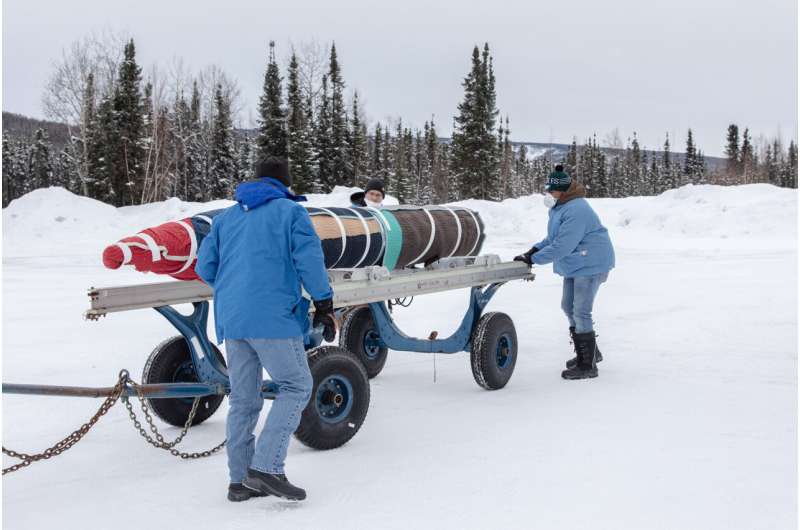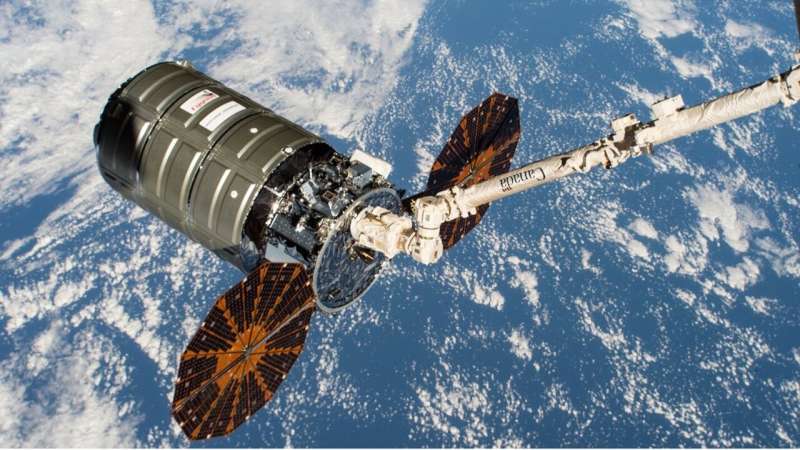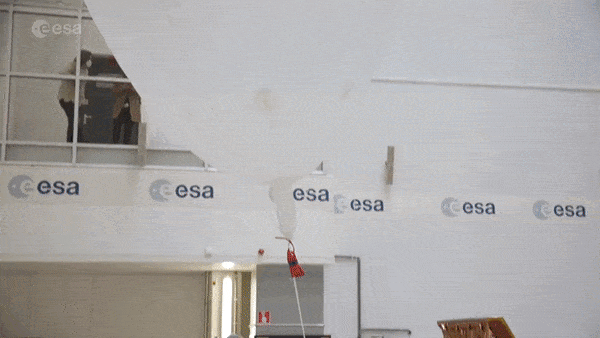
Copernical Team
Monitoring Arctic permafrost with satellites, supercomputers, and deep learning
 Permafrost - ground that has been permanently frozen for two or more years - makes up a large part of the Earth, around 15% of the Northern Hemisphere. Permafrost is important for our climate, containing large amounts of biomass stored as methane and carbon dioxide, making tundra soil a carbon sink. However, permafrost's innate characteristics and changing nature are not broadly understood.
Permafrost - ground that has been permanently frozen for two or more years - makes up a large part of the Earth, around 15% of the Northern Hemisphere. Permafrost is important for our climate, containing large amounts of biomass stored as methane and carbon dioxide, making tundra soil a carbon sink. However, permafrost's innate characteristics and changing nature are not broadly understood. Whitepaper highlights ground segment's critical role in satellite connectivity
 The satellite industry is set for unprecedented transformation, with the impact of cloud-based systems, the introduction of next-generation NGSO broadband constellations, and convergence towards a unified 5G network architecture. However, ground segments will also have to play a pivotal role to allow the industry to fully embrace and benefit from these changes.
While satellites have embark
The satellite industry is set for unprecedented transformation, with the impact of cloud-based systems, the introduction of next-generation NGSO broadband constellations, and convergence towards a unified 5G network architecture. However, ground segments will also have to play a pivotal role to allow the industry to fully embrace and benefit from these changes.
While satellites have embark Scottish Space Sector Charts Path to a Sustainable Future
 A specialist working group of the industry-led group Space Scotland is contributing to the development of a sustainable space sector by collaborating on a roadmap that will focus on environmental issues in one of Scotland's fastest-growing industries. On behalf of the Space Scotland's Environmental Task Force, AstroAgency and Optimat will work with Scottish companies, international collaborators
A specialist working group of the industry-led group Space Scotland is contributing to the development of a sustainable space sector by collaborating on a roadmap that will focus on environmental issues in one of Scotland's fastest-growing industries. On behalf of the Space Scotland's Environmental Task Force, AstroAgency and Optimat will work with Scottish companies, international collaborators SpaceX to launch SpaceLogistics Mission Extension Pod for Optus satellite
 Northrop Grumman Corporation's SpaceLogistics has announced a launch agreement for its Mission Robotic Vehicle (MRV) spacecraft, and the sale of its first Mission Extension Pod (MEP).
Under the launch agreement, SpaceX will provide launch services for a planned spring 2024 launch of the MRV and several MEPs. Optus, Australia's largest satellite owner and operator, recently completed a purchase
Northrop Grumman Corporation's SpaceLogistics has announced a launch agreement for its Mission Robotic Vehicle (MRV) spacecraft, and the sale of its first Mission Extension Pod (MEP).
Under the launch agreement, SpaceX will provide launch services for a planned spring 2024 launch of the MRV and several MEPs. Optus, Australia's largest satellite owner and operator, recently completed a purchase NASA rocket team to chase pulsating aurora

A new NASA sounding rocket mission will soon take to the Alaskan skies. The LAMP mission, short for Loss through Auroral Microburst Pulsations, will fly above an often-overlooked kind of northern lights to test a theory on what causes them. The launch window at Poker Flat Research Range in Fairbanks, Alaska, opens on Feb. 24, 2022.
The aurora borealis, or northern lights, is a familiar treat to those who call northern latitudes home. Auroras come in different shapes and colors, waving their ribbons of vibrant green, red and purple across the sky. But one variety of aurora displays a peculiar behavior: it pulsates.
High-flying NASA 'NACHOS' instrument may help predict volcanic eruptions

NASA is launching a prototype instrument that could make it easier to monitor volcanic activity and air quality. Perched aboard a CubeSat about 300 miles (480 kilometers) above Earth's surface, the "Nanosat Atmospheric Chemistry Hyperspectral Observation System," or NACHOS, will use a compact hyperspectral imager to locate sources of trace gasses in areas as small as 0.15 square miles (0.4 square kilometers)—about the size of the Mall of America in Minnesota. NACHOS is part of Northrop Grumman's 17th resupply mission to the International Space Station from NASA's Wallops Flight Facility on Wallops Island, Virginia.
If successful, NACHOS will be the smallest, highest resolution space-based instrument dedicated to monitoring atmospheric trace gasses like sulfur dioxide (SO2) and nitrogen dioxide, paving the way for future Earth-observing systems that will not only help predict volcanic eruptions, but also monitor air quality around specific cities, neighborhoods, and even individual power plants.
One week left to apply for the 2022 YGT Programme!

The ESA YGT call for applications closes 28 February 2022. Don’t hesitate to apply and kick-start your career in space today! Positions are available in engineering, science, IT and business services. Find out more and apply now.
Inflated activity
 Image:
Inflated activity
Image:
Inflated activity China's land-observing satellite starts to take pictures
 A Chinese remote-sensing satellite started to take pictures in its orbit, scientists in charge of the satellite said Friday.
China launched a Long March-4C rocket to place the L-SAR 01A satellite in space on Jan. 26. The satellite, equipped with L-band synthetic aperture radar (SAR), can monitor the geological environment, landslides, and earthquakes.
The radar is now capable of taki
A Chinese remote-sensing satellite started to take pictures in its orbit, scientists in charge of the satellite said Friday.
China launched a Long March-4C rocket to place the L-SAR 01A satellite in space on Jan. 26. The satellite, equipped with L-band synthetic aperture radar (SAR), can monitor the geological environment, landslides, and earthquakes.
The radar is now capable of taki Satellite imagery gives researchers timeline of when swine waste lagoons were built
 Researchers at North Carolina State University have developed an automated technique that uses satellite imagery to determine when swine waste lagoons were constructed, allowing researchers to determine the extent to which these facilities may have affected environmental quality.
Swine waste lagoons are outdoor basins used to store liquid manure produced by swine farming operations.
Researchers at North Carolina State University have developed an automated technique that uses satellite imagery to determine when swine waste lagoons were constructed, allowing researchers to determine the extent to which these facilities may have affected environmental quality.
Swine waste lagoons are outdoor basins used to store liquid manure produced by swine farming operations. 
